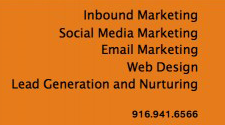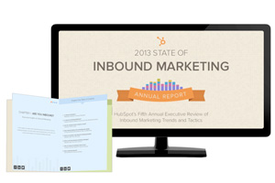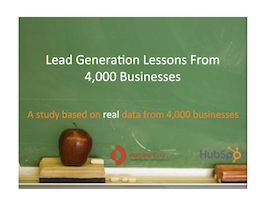Do you want to learn how to use social media marketing? Google it! I promise, at least one of the 704,000,000 results will have your answer!! We don't need another blog post on the subject!
Here's the question that most businesses need to answer:
Am I going to use social media marketing?
All the expert blog posts in the world won't do squat for you if you read them but never put their advice into action.
The #1 reason social media marketing doesn't work isn't because you're doing it wrong, it's because you aren't doing it at all!
A recent Mashable article claims that 81% of small and medium sized businesses use social media and that 94% of those do so for marketing purposes. The report says that for SMB's social media is the preferred marketing channel (You can download the entire report here).
I'm calling BS.
It is my business to to talk to SMB's about their marketing efforts. I do it almost every day. And while my information is anecdotal and the report referenced is from a online study, my experience does not come close to matching these numbers. Most businesses are NOT using social media.
Most of you know you aren't using social media in sort of a formal planned manner that is being measured and evaluated based on results. You're just not. In fact, most of you tell me you either don't think you need it (you're wrong), you don't have time (you're wrong), or you don't know how (you're right).
So I dug further into the report. It turns out that the study's definition of using social media includes reading it! Well there you go! Now I'm actually surprised to learn that only 81% of SMB's are reading social media! 20% aren't? What are they doing?
I'm pretty sure the companies using social media marketing the best and the most are the ones writing all these millions of blog posts on how to use social media marketing. Most of them know of what they speak (but there's really not enough subject matter to have to write about it a million times). They know that social media marketing is raising their profile in search engines, helping them to become established experts, and generally growing their exposure.
You can do this, too. An you should!
Do you know anything about your business? (Of course). Are any of the things you know of value to your customers and prospects? (Of course). Do you think they're searching online for answers you can provide? (Yep!). When they do that, are they finding your answers? (Doubtful. INstead they're finding someone else's, maybe your competitor's!).
You need to get committed to social media marketing. You can find a reason to do it (to grow your sales), you can find the time (minutes per day), and you can figure out how (read some of those blog posts, or hired someone who has)!
The reason social media marketing is not working for you isn't because you haven't read enough online articles on the subject, it's because you haven't followed those articles' example and put the method to work!
So please, no more blog posts on how to use social media marketing! Let's focus instead on putting all that information to use to grow your business!
So what about you? Are you committed to using social media marketing?




 I'll get to the questionable marketing value in a bit, but first, let's talk about associating a brand with the ideas and ideals put forth by the Russian government.
I'll get to the questionable marketing value in a bit, but first, let's talk about associating a brand with the ideas and ideals put forth by the Russian government. Let's start with the fact that over 45 commercials aired during the Super Bowl. Can you remember 12? 8? 5? Not easy, is it? Oh well, $4 million ain't what it used to be anyway.
Let's start with the fact that over 45 commercials aired during the Super Bowl. Can you remember 12? 8? 5? Not easy, is it? Oh well, $4 million ain't what it used to be anyway. What did you notice as the biggest difference between the winning Seattle Seahawks and the demolished Denver Broncos in in Super Bowl XLVIII? Did the Seahawks step it up a notch? Were the Broncos ill-prepared? Did the Broncos choke?
What did you notice as the biggest difference between the winning Seattle Seahawks and the demolished Denver Broncos in in Super Bowl XLVIII? Did the Seahawks step it up a notch? Were the Broncos ill-prepared? Did the Broncos choke? Googling "content marketing experts" returns 104,200,000 results. You might as well Google "story tellers"! Though that only returned 2,380,000 results...
Googling "content marketing experts" returns 104,200,000 results. You might as well Google "story tellers"! Though that only returned 2,380,000 results...
 Why the disconnect? 73% of digital marketers agree that brands are becoming publishers and 64% believe content marketing is becoming its own discipline (we'd argue that it always has been). Yet no strategy to support the effort? That's nuts!
Why the disconnect? 73% of digital marketers agree that brands are becoming publishers and 64% believe content marketing is becoming its own discipline (we'd argue that it always has been). Yet no strategy to support the effort? That's nuts! There can be no doubt as to the massive undertaking involved in building the Obamacare
There can be no doubt as to the massive undertaking involved in building the Obamacare  Rule #4, longterm success depends on a customer experience that builds trust and loyalty. The Obama administration has beat the bushes to find someone, anyone, who has had a good experience on the web site. This is exactly the opposite of the ideal scenario. Is anyone going to recommend healthcare.gov to their family and friends? It sure doesn't sound like it. Have follow up communications channels been established? Are consumers getting copies of the data being submitted to the insurance companies? Are return visitors being recognized by the site?
Rule #4, longterm success depends on a customer experience that builds trust and loyalty. The Obama administration has beat the bushes to find someone, anyone, who has had a good experience on the web site. This is exactly the opposite of the ideal scenario. Is anyone going to recommend healthcare.gov to their family and friends? It sure doesn't sound like it. Have follow up communications channels been established? Are consumers getting copies of the data being submitted to the insurance companies? Are return visitors being recognized by the site?_on_twitter.png?width=300&height=245&name=fireball_whisky_(fireballwhisky)_on_twitter.png) Check out
Check out  Time and resources are limited for small business owners. If too much time is spent keeping up on social networks, other important responsibilities fall by the wayside. As a small business owners myself, I empathize. However, the opportunity missed by ignoring social media can be big. We suggest the following is the least you should do to build business with social media.
Time and resources are limited for small business owners. If too much time is spent keeping up on social networks, other important responsibilities fall by the wayside. As a small business owners myself, I empathize. However, the opportunity missed by ignoring social media can be big. We suggest the following is the least you should do to build business with social media. Most of you are elbows deep in running your businesses. Your expertise shows in your products, services, and revenue. But marketing is not part of your skill set. As the saying goes, you don't know what you don't know. It has nothing to do with your expertise or knowledge, just that marketing requires a different skill set.
Most of you are elbows deep in running your businesses. Your expertise shows in your products, services, and revenue. But marketing is not part of your skill set. As the saying goes, you don't know what you don't know. It has nothing to do with your expertise or knowledge, just that marketing requires a different skill set.

